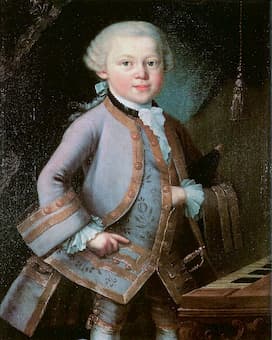
Mozart as a child, 1763 © CMUSE
The music of Mozart fascinates. Often, his name is synonymous with musical genius, and he is perhaps the most popular classical composer ever. His musical output and extraordinary life, including musical precocity, have been the subject of many studies, books, documentaries and films. While genius children do not lack in classical music, actually they are quite numerous, — Beethoven, Brahms, Saint-Saëns are three other well-known children prodigies —, Mozart’s particularly young and short life has been as rock’n’roll as the one of Michael Jackson; who, in quite a very different musical world, bears many similarities with the Austrian composer. Mozart was already touring at the age when most children still learn how to read and write, and it is well-known that before the age of ten, he had composed more works than many composers would in their own life, including his first symphonies.
All that makes him of course an admiration for all, particularly for non-musicians, to whom his talent remains a mystery, almost divine. For musicians though — the ones who understand the language of music — he is quite a fascination, but less of a divinity. So, what is it that makes Mozart so fascinating, three centuries after his death and more than many other successful composers?
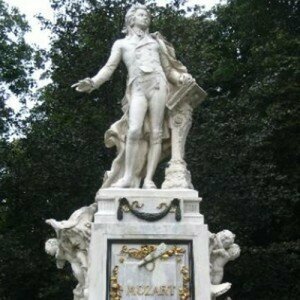
Mozart statue
Many aspects of Mozart’s life have participated in shaping the legend around his persona. First of all, there is his name: Johannes Chrysostomus Wolfgangus Theophilus Mozart, aka Wolfgang Amadeus Mozart. Theophilus, Amadeus, the friend of God, the one who loves God.
Secondly, there is the child prodigy aspect of his life; his father, a composer, musician and teacher himself, recognised the musical talents of both Mozart and his sister early in their childhood, and very quickly turned the two of them into spectacular musicians, enduring a young life of hard musical practice, touring and composing. It is said that Mozart’s first composition was at the age of four. By the age of eight, he had written his first symphony.
Wolfgang Amadeus Mozart: Symphony No. 1 in E-Flat Major, K. 16 – I. Molto allegro (Stuttgart Radio Symphony Orchestra; Roger Norrington, cond.)
Altogether, Mozart composed over six hundred works in a life of thirty-five years.
His death too, has often been mythologised, particularly within the context of his last work; a requiem — a mass for the dead —, unfinished and commissioned secretly.
Then of course, there is also Mozart’s eccentric personality; his — what could be called a Peter Pan syndrome — childish and almost scoundrel behaviour — brilliantly portrayed in Milos Forman’s Amadeus, contrasting with his divine music.
Finally, Mozart’s popularity was emphasised by his successor; Beethoven’s — himself, another genius — admiration and support of the composer’s music. The German composer, fifteen years younger than Mozart, followed directly in his footsteps…
Wolfgang Amadeus Mozart: Requiem in D Minor, K. 626 – Sequence No. 6: Lacrimosa dies illa (Chorus) (Konzertvereinigung Wiener Staatsopernchor; Vienna Philharmonic Orchestra; Bruno Walter, cond.)
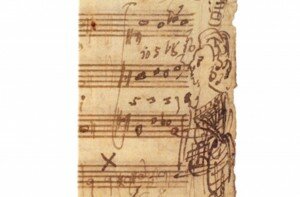
Mozart’s manuscript, portrait of Barbara Ployer
Yet, when one pays close attention to Mozart’s music; the impressions are quite different. Yes it is excellent music, fantastically composed, balanced, elegant, a reflection of the composer’s own personality, as well as a reflection of the times he lived in. But, compared to some of the other geniuses of academic music — Beethoven again, for instance — it is (deceptively) quite simple, almost repetitive, structurally similar, and many ideas and devices are often inter-used between pieces.
The conclusion is simple, yet a genius, Mozart cannot be seen as a rule maker — such as Bach — or a revolutionary — such as Beethoven. In simple words, Mozart did not invent or reinvent the wheel; rather he processed and operated it; and he has done it inarguably quite brilliantly. If there is an example of a composer who used the rules and traditions of his time to the point, then it is him.
One who wishes to understand what classical music is – and by classical, it is the period — then one needs to listen to Mozart and Mozart only.
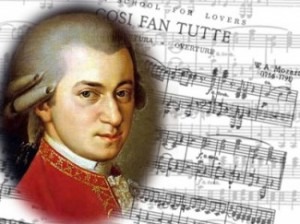
© polyglottutor.files.wordpress.com
Mozart wrote to patrons, out of necessity one would say, and therefore his work would follow instructions, and common structures and directions. It was more about satisfying rather than surprising — which perhaps explains the smaller room for improvement and development in his music.
Having written these last paragraphs, it is quite impossible not to acknowledge Mozart’s role in developing the genre of opera — bringing its subjects and themes to the common mortals and societies, and away from mythology and the uber-Man — or the concerto — through finding the perfect equilibrium between soloists and orchestras, within the sonata form.
So, why is Mozart’s music so popular? Well, for the same reason that Bob Dylan’s music is so popular; it is simple, understandable, accessible, familiar and deals with concepts that are accessible to all — e.g. his operas. It does not aim at musical progress and innovation, at bringing the listener out of his comfort zone; it is melodic — and melody is key to popularity. It is diverse and appeals to all tastes — from opera, to chamber and symphonic music. Finally, it has musical interest — behind this apparent simplicity, Mozart would sprinkle his music with interesting musical surprises and twists — he is well-known for using chromaticism at a time where it was still considered a strong dissonance, and two centuries before Charlie Parker and Dizzy Gillespie used it as the foundation of bebop!
For more of the best in classical music, sign up to our E-Newsletter

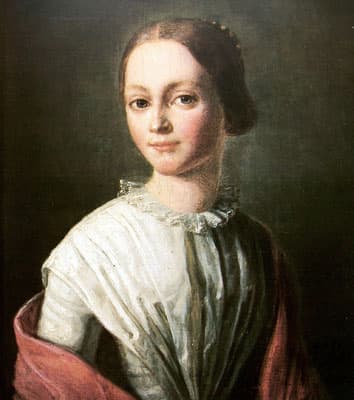
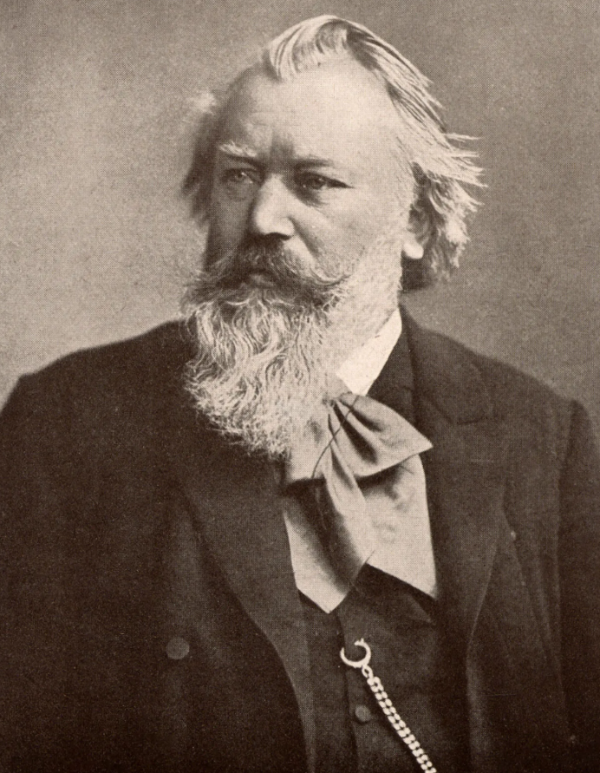
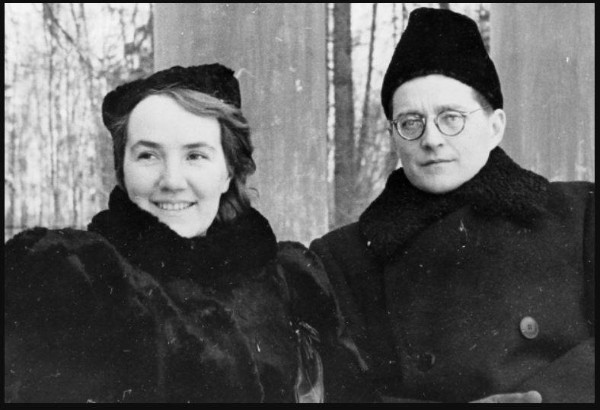
Seriously, Mozart is not revolutionary? Come on. His piano concertos, keyboard fantasias, and ensembles (along with Haydn) are what sets the stage for next generation music. Your conclusion that Mozart’s music is *popular* because of simple melodies and easy listening is correct, but to say that his music does not aim to bring innovation is just false. Serious musicians know that Mozart wrote innovative works like the 24th Piano Concerto, String Quartet No. 19, Organ Fantasia in F Minor, Great Mass in C Minor, Fugue in C Minor, and Don Giovanni.
The point is broadly valid. Compared to composers like Bach, Beethoven, Debussy – Mozart was not a revolutionary.
Indeed I agree with this. Mozart perfected the Classical Style to its peak, he was not a revolutionizer or innovator. He did innovate sometimes but that was not in his nature and he certainly did not do so consciously. He just wrote whatever was it that he had inside his head- regardless- as he seemed unaffected by all external non-musical factors.
Beethoven’s music reflects the turbulent, ever changing times he lived in, the marvellous Nature that so awed him on a daily basis and the rage he had inside him. Mozart just wrote all he had in him, accumulated since childhood, as though he stored a musical dictionary which allowed him to make a quasi infinite amount of combinations. His music is free from any grand or preconceived idea, shows no traces of his personal life, does not invite us to his workshop, is not stamped by Nature and he does not deliver it to us with any meaning attached. It’s as impersonal as it gets and we give it whatever meaning we want. It’s like the music was just there, lost about, and whoever is faced with it can do as he/she pleases. I, personally, see in it the innocence and glorious tenderness of childhood. It’s pristine, pure and inspires feeling rather than thought. But that is just me and I understand that young people, in Ernest Newman’s words, “are more attracted to ideas than love” (can’t quite remember the exact words and I’m not about to go search for the- admittedly lovely- essay he wrote late in life).
When I made my initial comment, I was not protesting against Mozart’s music being branded simple or this or that, just that the article seemed to exude a certain haughtiness in relation to this particular composer which I find more typical of a Reddit user who just got into classical music and wants to look “cool” by going against the grain. I also took issue with the idea that Mozart is more liked by the public than by musicians which was a ridiculous notion up until the late 20th Century, when being familiar with Mozart was a mark of Cast and he was a “Musician’s Musician”. It was the democratization of music, everyone having access to it 24/7, that put Mozart (and Bach) on the same level as Beethoven in the public’s mind since their music was mostly out of the public sphere up until then. And, if we lower the conversation a little bit into NFL Classical Music style, I have yet to see a composer so revered among the giants as Mozart.
However, I now understand Doug Thomas was very far from being the music-writer-Hooligan who wants his time in the limelight by going after Mozart gratuitously and did not mean what I initially thought. His words make sense and I look forward to more articles from him.
There are a couple points I think are inaccurate in this article, the first is that Mozart was like the character in the movie Amadeus in real life. There is not much evidence to support this claim. Secondly that he wasn’t innovative. The innovative aspects of his music are many and would be far too numerous to list in this post. The late symphonies, piano concertos, much of the chamber music etc. have lots of innovation. Brahms claimed Mozart’s opera Idomeneo had true dissonance beyond what one encounters in Beethoven. Mozart’s graceful style of composing can mask how innovative his music often was. Beethoven was a lot louder and, in my view, even histrionic at times in his music, so, I think this contributes to why he is viewed as so revolutionary.
I have to agree with Doug. I don’t think Mozart revolutionized music or the style he wrote in, it seems to me that he perfected the craft and style that prevailed at the time. He applied his own unique genius and hard work to the existing genres and style and refined it to an incredibly high degree to such an extent that his work can be viewed as the epitome of the style.
I am returning to the comments of the article after quite a while and I am both thankful for the time that you have spent reflecting and commenting, and also slightly amused that of all the articles that I modestly wrote, this one gets the most attention… Doesn’t that makes a point in the fact that Mozart – and do not get me wrong, once again I admire his talent, genius and music, being myself a much more banal composer – benefits of a particular treatment from us all, which Haydn or other contemporaries could have just gotten too, but which do not? I am far from the polemic, I simply enjoy igniting an exchange of ideas!
Perhaps it does, perhaps it does not. Either way, I am not particularly concerned about it nor do I make any apologies for it. Haydn was the most famous and successful composer of his time and a lot of Mozart contemporaries were more revered, famous and successful than him. As much as Revisionism has tried to claim that Mozart was very well-known and applauded and this and that in his lifetime, it is obvious from a throughout study of his letters and context he was just one of many in Vienna and that, after the Marriage of Figaro, something happened that made him pretty much disappear from the public.
While Haydn had a personal biographer with him at all times and every famous composer had the greatest painter around portraying him in the fanciest of wigs, there are only a few first-hand accounts of Mozart, mostly either apocryphal or tampered with, and all told only decades after he died, which is enough to show that no one suspected what kind of musician he was, nor did anyone give him a second thought when alive and, perhaps, even in the years the Mozart phenomena was still slowly but surely building. The fact he had his brother-in-law portray him in a half-arsed painting rather than the household name of the time like any composer worth his salt is also a good indication that the love Mozart enjoys now was long overdue. When almost all half-decent composers in Vienna were invited to attend the coronation festivities of the new Emperor, Leopold II as King of Bohemia, he was not and no one had a clue as to who Mozart was when he travelled there in 1790 by his own initiative.
As much as it is fashionable now to follow that narrative, it is not a myth that Mozart was neglected and lived an unrecognized, mediocre adult life, with only two persons aware of his genius- himself and Haydn- lacking a single patron of which Beethoven boasted dozens, as did Haydn and many of his contemporaries.
Contrarily to any other composer, he did not have anyone championing him, did not have the Royalty on his hand and, when he died, all Mozart had was his works and his illiterate wife to speak for him. And he still managed to go down in History. There is no one else, not even Schubert, who managed to claim a spot in the cut-throat, sponsored dependent Music Art history with nothing but his art doing the talk.
So let him be loved and benefit from that treatment that so amuses you and, I’m sure, many others. Perhaps that’s the reason there are so many “Mozart Is Overrated” threads on Reddit, although you have been minutely and assiduously exonerated from any such charges by whomever may be Classical Music’s Judge Judy and, honestly, that’s as much a reason to hate him as it is to love him. And I sure do!
I adore Mozart’s music, and listen to it most of the time. But by chance I am listening to our own Kathleen Ferrier singing “O thou that tellest good tidings to Zion” composed in London by our own naturalised Frederick Handel using the English language of our own King James Authorised Version of the Holy Bible. Contralto are what I miss most from my beloved Mozart.